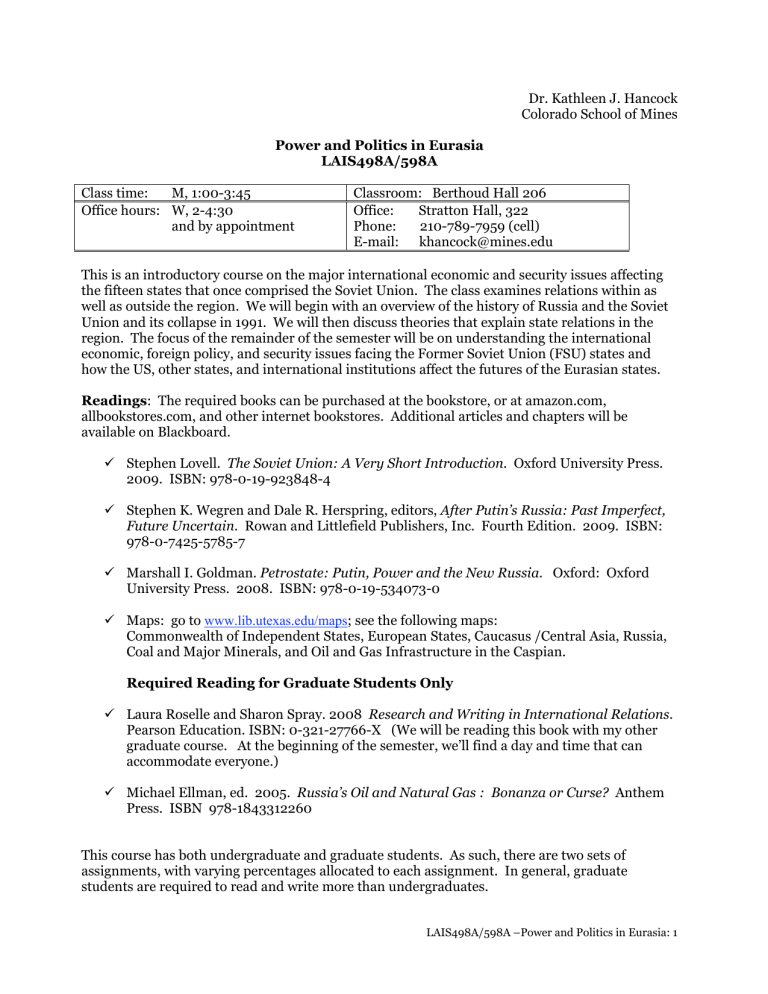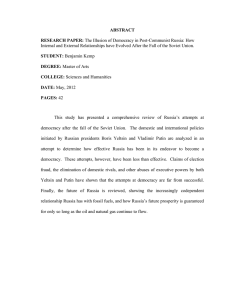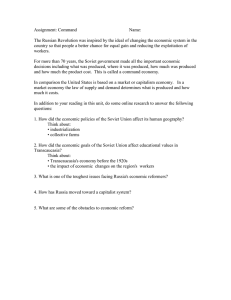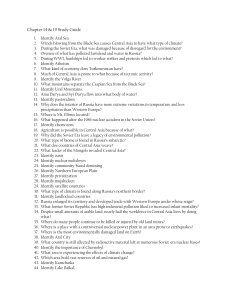Dr. Kathleen J. Hancock Colorado School of Mines

Dr. Kathleen J. Hancock
Colorado School of Mines
Class time: M, 1:00-3:45
Office hours: W, 2-4:30
Power and Politics in Eurasia
LAIS498A/598A
Classroom: Berthoud Hall 206 and by appointment
Office: Stratton Hall, 322
Phone: 210-789-7959 (cell)
E-mail: khancock@mines.edu
This is an introductory course on the major international economic and security issues affecting the fifteen states that once comprised the Soviet Union. The class examines relations within as well as outside the region. We will begin with an overview of the history of Russia and the Soviet
Union and its collapse in 1991. We will then discuss theories that explain state relations in the region. The focus of the remainder of the semester will be on understanding the international economic, foreign policy, and security issues facing the Former Soviet Union (FSU) states and how the US, other states, and international institutions affect the futures of the Eurasian states.
Readings : The required books can be purchased at the bookstore, or at amazon.com, allbookstores.com, and other internet bookstores. Additional articles and chapters will be available on Blackboard.
Stephen Lovell. The Soviet Union: A Very Short Introduction.
Oxford University Press.
2009. ISBN: 978-0-19-923848-4
Stephen K. Wegren and Dale R. Herspring, editors, After Putin’s Russia: Past Imperfect,
Future Uncertain.
Rowan and Littlefield Publishers, Inc. Fourth Edition. 2009. ISBN:
978-0-7425-5785-7
Marshall I. Goldman. Petrostate: Putin, Power and the New Russia.
Oxford: Oxford
University Press. 2008. ISBN: 978-0-19-534073-0
Maps: go to www.lib.utexas.edu/maps ; see the following maps:
Commonwealth of Independent States, European States, Caucasus /Central Asia, Russia,
Coal and Major Minerals, and Oil and Gas Infrastructure in the Caspian.
Required Reading for Graduate Students Only
Laura Roselle and Sharon Spray. 2008 Research and Writing in International Relations.
Pearson Education. ISBN: 0-321-27766-X (We will be reading this book with my other graduate course. At the beginning of the semester, we’ll find a day and time that can accommodate everyone.)
Michael Ellman, ed. 2005. Russia’s Oil and Natural Gas : Bonanza or Curse? Anthem
Press. ISBN 978-1843312260
This course has both undergraduate and graduate students. As such, there are two sets of assignments, with varying percentages allocated to each assignment. In general, graduate students are required to read and write more than undergraduates.
LAIS498A/598A –Power and Politics in Eurasia: 1
Grading for Graduate Students
Meet the Professor (no grade)
All graduate students who are taking a course with me for the first time are required to come hang out with me for at least 20 minutes. Returning students are encouraged to meet with me. These will be scheduled early in the semester.
Purpose : These meetings allow me on occasion to tilt the discussion and assignments toward your interests, background, and expectations; to allow you to share any important information about yourself; to ask me specific questions; and to give you an opportunity to better know me and become more comfortable speaking in class.
General Participation: 20%
You are expected to actively participate in all sessions. This is a critical aspect of a Master’s seminar. There are no lectures. The course thus depends on students’ informed discussion of the reading materials. Only in this way will you really master the theories and their applications. To earn an A for participation, you will need to consistently demonstrate y0ur knowledge of the material via your in-class comments. If you are not in the classroom, you will not be able to participate. Attendance is thus critical for your success in this course.
Purpose : To enable us to cover much more material than can be included in the written papers; to share your insights with others; to practice articulating arguments; to demonstrate that you thoroughly read the assigned readings, including points you did not cover in the written assignment; and to see how others understand the readings. I expect to hear a wide variety of comments. You will find that you agree with some authors and disagree with others. We will explore why that is and try to determine the strengths and weaknesses of the various readings.
Weekly Papers: 20%
Starting with Week 2, you will write a 2-page, single-spaced paper analyzing the readings. These must include ALL readings assigned for the week. Graduate students are assigned the listed readings plus those that follow “598.” Rather than individual summaries for each chapter or article, you should write an analysis that compares the various readings/chapters, highlighting similarities and differences or observations about the argument. You may also connect arguments to earlier readings. Use endnotes to cite your sources; these do not count toward the
2-page limit.
Papers are due at the beginning of class. Late papers will not be accepted. These are critical to helping you synthesize the readings and prepare yourself for the in-class discussion. If you do not turn in a paper, you will receive 0 out of 100 points. Please make every effort to turn in something each week, even if it is not your best effort.
An A paper (95 points) will cover all the articles and/or chapters; demonstrate a clear understanding of all readings; make interesting observations/comparisons about the arguments; have nearly perfect punctuation, grammar, and word choice; and properly cite authors using endnotes. A B paper (85) will have most of the attributes of an A paper but have less interesting observations, skip one of the readings, or have numerous writing errors. A C paper (75) will skip two readings, or cover all readings but only as summaries rather than comparisons. A D (65) paper will address the assignment but miss several required components. An F paper (0) will be blank, or the equivalent of blank.
Purpose : To help you synthesize the readings and prepare yourself for in-class discussion; to force you to focus on only the most important aspects of the argument; to give you lots of practice in how to write professionally and to you for the longer writing assignments; to help sharpen your analysis (it’s harder to fudge an argument when you put it in writing); and to give you summaries to return to when writing your final paper.
LAIS498A/598A –Power and Politics in Eurasia: 2
In-depth Paper: 10%
For one week, instead of a 2-page paper, you will write a more extensive analysis. This paper should be about 7 pages double-spaced and go into greater depth on the arguments and your analysis. During the week you write an in-depth paper, you will present your findings to the class in a 10-minute opening discussion.
Purpose : To serve as an intermediary between the very short papers and the final research paper and thus further prepare you for the final paper; to allow you to write a more elaborate argument, which can be liberating after being confined to very short papers; and, though the presentation, to ensure that everyone gets a chance to take a more prominent role in discussion.
Geography Test: 5%
In the second class, we will have a geography test; the following week, we’ll repeat the test. Your final grade for this portion of the class will be an average of the two tests. On a map, you should be able to identify the 15 former Soviet republics, their capitals, significant neighbors, and major mountain ranges, seas, and other markers; on the first day of class, you will receive a list of what you need to know.
Purpose : To quickly familiarize everyone with major geographic sites. The sooner we know the geography of the region, the more easily we can talk with ease about major issues, such as pipeline conduits that run between state and ethnic conflict with bordering states.
Congressional Testimony (group project): 15%
Each group will prepare a 20-minute written testimony on current events in the region, which it will present to the class. Other class members will act as Senators, asking follow up questions of those testifying. Groups will choose to focus on domestic politics, domestic economic issues, international economic issues, regional security, international security (such as arms control or ethnic conflict between states), or general foreign policy. The testimony will focus on one or more of the 15 FSU states and will include policy recommendations. Students will write evaluations of their own group members as a check on making sure everyone is doing their part.
In most cases, group members will get the same grade; however, if the evaluations suggest one or more students are doing exceptional work, or free-riding, their grades reflect that difference.
Purpose : To work on group skills; to learn more about a current issue and how to research current issues as opposed to historical ones; to practice thinking through the policy implications of research findings; and to learn how congressional testimony is prepared, given, and discussed in the U.S. Congress.
Final Research Paper: 30%
You will write a final paper, 20-pages double-spaced, that addresses an issue related to the region.
Your selected issue may be similar to those addressed in the congressional testimony, including the issue your group worked on, but will be much longer and more in depth than the testimony.
Your grade will be based on how thoroughly and accurately you cover the topic, your demonstrated knowledge of the readings covered throughout the course, your ability to communicate effectively (well organized paper, interesting word choice, proper punctuation and grammar, etc.) and how well you follow the various detail requirements (page-length, citations, reference page, etc.).
Purpose: To give you an opportunity to more thoroughly research a topic of interest; to practice researching and writing longer papers; to bring together a number of reading materials from class; and to continue to build on writing skills, including citations, grammar, etc. that we have been using throughout the course.
LAIS498A/598A –Power and Politics in Eurasia: 3
Grading for Undergraduate Students
Meet the Professor: 5%
Undergraduate students are required to meet with the professor for 20 minutes to discuss your background, your interest in the course, and anything else you would like to share with me.
Merely attending and actively engaging in the discussion will earn you an A (95 points). These will be scheduled at the beginning of the semester.
General Participation: 15% Same as for Graduates; read descriptions above.
Weekly Papers: 20% Same requirements as for Graduates, except papers are 1-page, single-spaced and do not have to (but may) cover readings prefaced 598 . In addition, your lowest grade will be dropped.
In-depth Paper: 10% Same as for Graduates, except papers are 5-pages long and do not have to (but may) cover readings prefaced 598 . You will follow the graduate students’ presentation that week with less formal comments of your own.
Geography Test: 5% Same as for Graduates.
Congressional Testimony: 15% Same as for Graduates.
Final Research Paper: 30% Same as for Graduates, except papers will be 15-pages.
Late Paper Penalties Late research proposals, written testimony, in-depth papers, and final papers will receive a 5-point grade reduction per day late (90 falls to 85 after one day, to 80 after two days, etc.), including weekends. Don’t make me do it: turn it in on time.
Incompletes: Under University policy, incompletes can be given “if a student, because of illness or other reasonable excuse, fails to complete a course.” The grade indicates “deficiency in quantity of work and is temporary.”
Communication Please come to my office hours as often as you like. If you cannot come at my scheduled hours, set up an appointment or call me. Feel free to talk with me before or after class.
Email should be reserved for simple questions which can be quickly answered. For more complex questions, please call or see me in person. I will occasionally send emails to the class. Please be sure to check for messages from me every few days so as to avoid missing important news or clarifications.
Students with Disabilities Support services, including registration assistance, are available to students with documented disabilities through the Office of Services for Students with
Disabilities, 303-273-3377.
Academic Integrity Be honest in your work. Academic dishonesty is not tolerated at CSM.
Students who engage in misconduct may face a range of sanctions, including disciplinary change of grade, loss of institutional privileges or, in extreme cases, academic suspension or dismissal.
For more information on these policies, see the Graduate Bulletin, Academic Integrity.
In a writing intensive course such as this one, students must avoid intentionally or unintentionally committing plagiarism (“presenting the work of another as one’s own”). In your long research paper and in weekly papers, whether paraphrasing or directly quoting, you must cite your sources. We will discuss this in class, but if you are still unsure about when and how to cite, please come see me or ask questions in class.
Week Dates
1 Aug.
30
Topics and Reading Assignments
* = articles can be found on Blackboard; google = article can be found on-line;
598 = graduate students only
Russia and The Soviet Union
Introduction, handouts, maps
LAIS498A/598A –Power and Politics in Eurasia: 4
2
3
4
5
6
7
Sept. 6 Geography Test (5%)
Lovell, “Introduction,” Ch. 1: “Future and Past”; ch. 4: “Elite and Masses”
Sept.
13
Geography Test (5%)
* Peter Kenez. 2006. “High Stalinism,” in A History of the Soviet Union from the
Beginning to the End , 103-131. New York: Cambridge University Press.
20
Lovell, ch. 6: “East and West.”
598: Lovell, ch. 5: “Patriotism and Multinationalism”
The Collapse of the Soviet Union
* Martin McCauley. 2008. “Ave Atque Vale,” in The Rise and Fall of the Soviet
Union , 1-23. Essex: Pearson Education Limited.
* Padma Desai. “Russian Retrospectives on Reforms from Yeltsin to Putin.” Journal of Economic Perspectives 19, no. 1 (2005): 87-106.
Oct. 4
Lovell, conclusion.
598: * Marples, David R. 2004. “Why did the Soviet Union collapse?” in The
Collapse of the Soviet Union, 1985-1991 , 101-110. Essex: Pearson Longman
The Putin and Post-Putin Years, domestic politics
Wegren & Herspring (W&H), introduction, ch. 1 (Political Leadership), ch. 4 (The Law in Post-Putin Russia), ch. 5 (The Media and Political Development)
598: W&H, ch. 2 (Parliament and the Dominant Party Regime), ch. 3 (The Regions under Putin and After)
Economics
Lovell, ch. 3: “Poverty and wealth.”
W&H, ch. 7, “The Oligarchs and Economic Development.”
*Ferdinand, Peter. "Russia and China: Converging Responses to Globalization."
International Affairs 83, no. 4 (2007): 655-80. (google)
*Anders Äslund. “Why Doesn’t Russia Join the WTO?” The Washington Quarterly ,
April 2010, 49-63. (google)
598 : W&H: ch. 6 (Russia’s Population Perils)
* CRS Report for Congress: Russia’s Accession to the WTO.” January 7, 2008.
11 guest speaker: Dr. Charles Ziegler
* Dunlop, John B. "Russia under Putin: Reintegrating The ‘Post-Soviet Space’.”
Journal of Democracy 11, no. 3 (2000): 39-47.
*Hancock, Kathleen J. “The Semi-Sovereign State: Belarus and the Russian Neo-
Empire.” Foreign Policy Analysis.
(2006) 2(2): 117-136.
* Pomfret, Richard. “Kazakhstan’s Economy since Independence: Does the Oil Boom
Offer a Second Chance for Sustainable Development?” Europe-Asia Studies Vol. 57,
No. 6, September 2005: 859–876
LAIS498A/598A –Power and Politics in Eurasia: 5
8
9
10
11
12
13
598: W&H, ch. 8 (Crime, Organized Crime, and Corruption), ch. 9 (Agriculture in the Late Putin Period and Beyond); Elmann, ch. 9 (“A Frozen Venezuala? The
Resource Curse and Russian Politics”).
18 FALL BREAK – no classes
25
Marshall, intro and ch. 3-4.
Energy Politics
* Edward Lucas, 2008 “Pipeline Politics: The Threat and the Reality,” in The New
Cold War , Edward Lucas, 163-188. New York: Palgrave MacMillan
598: Ellman, chapters 1-2 (“The Issues,” and “Energy and the Economy”); The Oil and the Glory , ch. 10-11.
Nov. 1 Marshall, ch. 5-7; The Oil and the Glory , ch. 20-epilogue, pp. 345-399.
598: rest of Marshall; Ellman, ch. 5-8 (“Sustaining Growth in a Hydrocarbon-based
Economy,” “The Road to Spontaneous Diversification,” “Economic Growth and the
Mobilization Model,” and “The Importance of Geography.”).
8
Congressional Testimony
Written testimony is due at the beginning of class.
15 Foreign Policy
W&H, ch. 10 (“Russia’s Foreign Policy”), and 11 (“Russia and Central Asia’s
Multivector Foreign Policies”)
* David J. Kramer. “Resetting U.S.-Russian Relations: It Takes Two.” The
Washington Quarterly , 33:1, January 2010: 61-79.
* Edward Lucas, 2008, “Saber-Rattling, or Selling Sabers: Russia’s Foreign Policy
Unpicked,” in The New Cold War , 189-206. New York: Palgrave MacMillan
22 Policy Paper Topic Due
* Peter Brookes. “Angry Bear Freezes Europe,” Jan. 9, 2009. Military.com.
* Andrei Tsygankov. 2009. “The Anti-Russian Lobby,” in Russophobia: Anti-
Russian Lobby and American Foreign Policy , 21-45. New York: Palgrave Macmillan.
* Yu Bin. “In Search for a Normal Relationship: China and Russia into the 21 st
Century.” China & Eurasia Forum Quarterly . Vol. 5 (4): 47-81.
29 http://www.isdp.eu/files/publications/cefq/07/yb07chinarussia.pdf
598: * Jeffrey Mankoff, “Rising China and Russia’s Asian Vector,” in Russian
Foreign Policy: The Return of Great Power Politics , 193-240. Lanham, Maryland:
Rowman & Littlefield Publishers, Inc.
Security
W&H, ch. 12 (Putin, Medvedev, and the Russian Military).
*John Wood. “The Wounded Russian Bear with Sharp Claws,” in Russia, the
Asymmetric Threat to the United States: A Potent Mixture of Energy and Missiles ,
John Wood, 46-75. Santa Barbara, California: Praeger Security International.
* Peter Brookes, “(More) Bad News Bear” (Aug. 18, 2008), found on military.com.
LAIS498A/598A –Power and Politics in Eurasia: 6
14 Dec.
6
Finals
Week
* International Institute for Strategic Studies. The Military Balance, 2010.
Chapter
4, 211-234.
598: *James M. Goldgeier, Michael McFaul. “NATO is a Four-Letter Word,” in
Power and Purpose: U.S. Policy toward Russia after the Cold War, 183-210.
Washington, DC: Brookings Institution Press.
Democracies or Autocracies?
* Hale, Henry E. “Regime Cycles: Democracy, Autocracy, and Revolution in Post-
Soviet Eurasia,” World Politics - Volume 58, Number 1, October 2005, pp. 133-165
Lovell, ch. 2: Coercion and Participation.
W&H, conclusion (Whither Putinism?)
Freedom in the World, Country Reports, 2010. Read reports for 5 FSU states. http://www.freedomhouse.org/
598 : * Charles E. Ziegler. “Russia and the CIS in 2008: Axis of Authoritarianism?
Asian Survey 49, 1 (2009): 135-145.
Policy Paper due – date TBA
LAIS498A/598A –Power and Politics in Eurasia: 7




